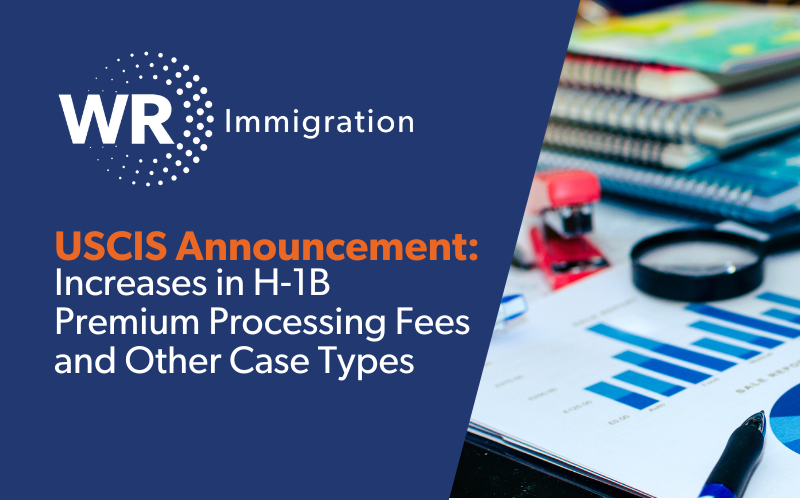** Update and Clarification for H-4 and L-2: DHS Increases Premium Processing Fees **
Despite the information provided by USCIS in its December 27, 2023 press release, Form I-539 Applications for a change or extension of stay for H-4 and L-2 dependents are not eligible for Premium Processing. However, if such applications are submitted together with the principal H-1B or L-1 beneficiary’s I-129 Petition, USCIS will review the Form I-539 as soon as possible after reviewing the Form I-129 which, when a Form I-129 is filed via Premium Processing, means that the Form I-539 for dependents will likely be adjudicated (approval, denial, RFE, NOID or referred for an investigation) within the premium processing timeframe.
Original Post from 12/27/2023
In a recent update, the U.S. Citizenship and Immigration Services (USCIS) has announced a final rule to adjust premium processing fees to account for inflation, with the changes set to take effect on February 26, 2024.
The premium processing fees were initially established under the USCIS Stabilization Act, which granted the Department of Homeland Security (DHS) the authority to periodically adjust these fees. After maintaining these fees at the same level for three years, USCIS has decided to implement adjustments based on the Consumer Price Index for All Urban Consumers, covering the period from June 2021 to June 2023.
Insight for Corporate Immigration Professionals: We recommend strategizing with counsel on what cases may potentially be filed by February 26, 2024 to get ahead of the Premium Processing fee increases, if at all possible.
Here’s a quick breakdown of the Premium Processing fee increases for various case types:
- Form I-129, Petition for a Nonimmigrant Worker (H-1B, L-1A, L-1B, O-1, TN-1, etc.):
- Previous Fee: $2,500
- New Fee: $2,805
- Form I-129, Petition for a Nonimmigrant Worker (H-2B or R-1 nonimmigrant status)
- Previous Fee: $1,500
- New Fee: $1,685
- Form I-140, Immigrant Petition for Alien Worker:
- Previous Fee: $2,500 (Employment-based (EB) classifications)
- New Fee: $2,805 (Employment-based (EB) classifications)
- Form I-539, Application to Extend/Change Nonimmigrant Status:
- Previous Fee: $1,750 (Various classifications)
- New Fee: $1,965 (Various classifications)
- Form I-765, Application for Employment Authorization:
- Previous Fee: $1,500 (Certain F-1 students with specific categories)
- New Fee: $1,685 (Certain F-1 students with specific categories)
You can view the full list of fee adjustments in the USCIS announcement.
According to USCIS, the additional revenue from these fee increases will be used to “make improvements to adjudications processes; respond to adjudication demands, including reducing benefit request processing backlogs; and otherwise fund USCIS adjudication and naturalization services.”
For more insight on how to prepare your company for these fee increases, be sure to sign up for our upcoming Chatting with Charlie webinar here!


